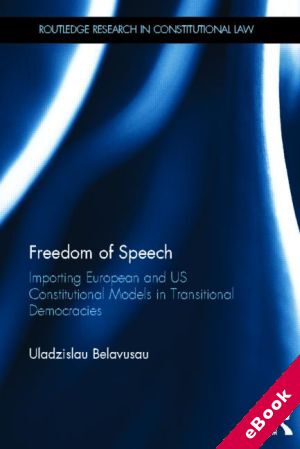
The device(s) you use to access the eBook content must be authorized with an Adobe ID before you download the product otherwise it will fail to register correctly.
For further information see https://www.wildy.com/ebook-formats
Once the order is confirmed an automated e-mail will be sent to you to allow you to download the eBook.
All eBooks are supplied firm sale and cannot be returned. If you believe there is a fault with your eBook then contact us on ebooks@wildy.com and we will help in resolving the issue. This does not affect your statutory rights.
This book considers the issue of free speech in transitional democracies focusing on the socio-legal developments in the Czech Republic, Hungary, and Poland. In showing how these Central and Eastern European countries have engaged with free speech models imported from the US and the EU the book offers valuable insights into the ways they have responded to challenges associated with transformation from communism to Western democracy. The book explores freedom of expression looking particularly at hate speech, historical revisionism and obscenity it considers topics such as genocide denial, the rise of Prague and Budapest as Europe's pornography capitals, virulent Islamophobia, and the glorification of terrorism.
The book inquires into the role and perspectives of the European and USA constitutional models of the right to freedom of expression for the constitutional debate in Central and Eastern Europe. The book offers an original interpretation of the "European" model of freedom of expression demonstrating how recent ECJ decisions have implicitly consolidated the constitutional narratives on hate speech and contributed to an ever-harmonising 'European freedom of expression'. This book will be of interest to students and scholars of, comparative constitutional law, law and society, human rights and European law as well as political philosophers.